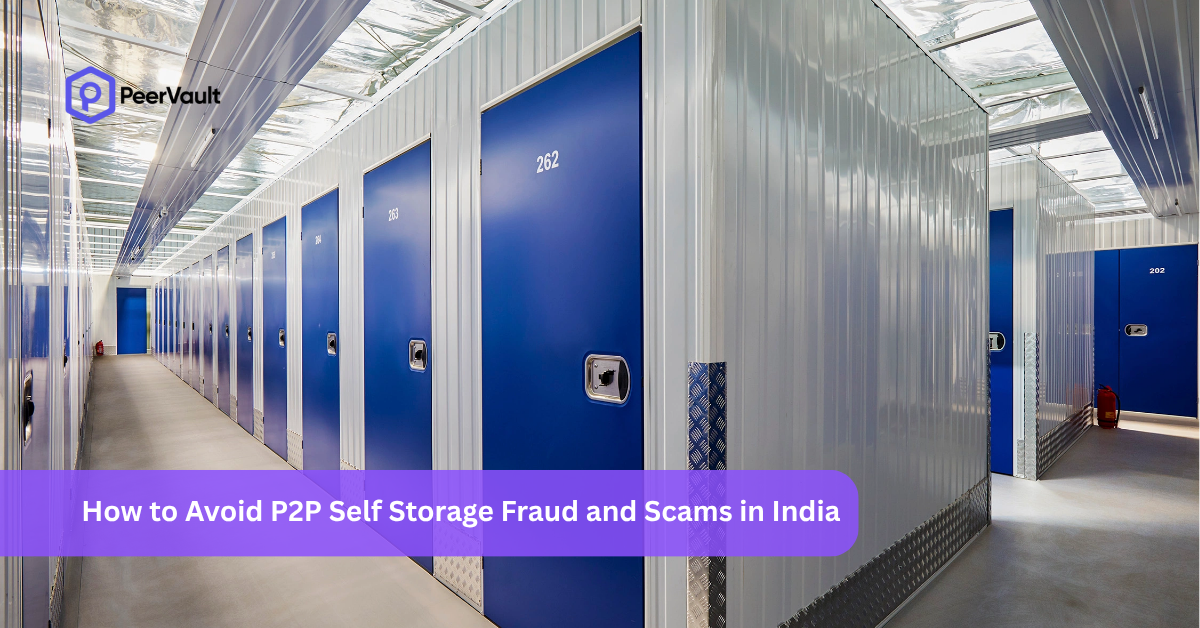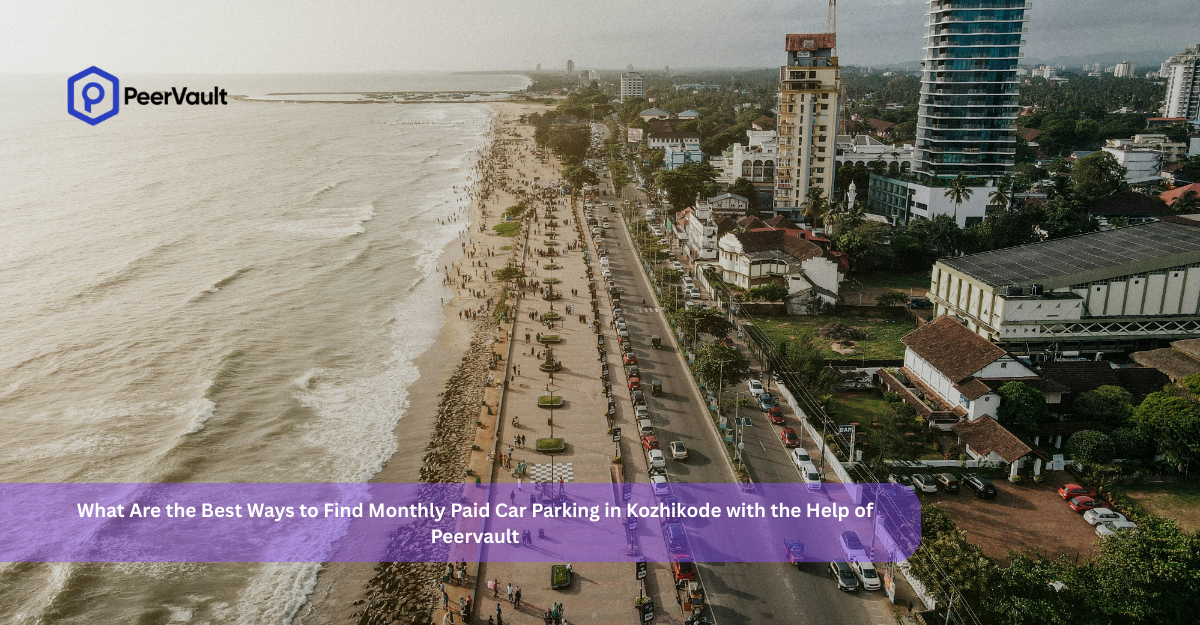How to Avoid P2P Self Storage Fraud and Scams in India

Space is a luxury. With smaller apartments, frequent job relocations, and the rise of remote work, people are constantly looking for smart ways to store their belongings. That’s where Peer-to-Peer (P2P) self-storage comes in.
Instead of renting expensive commercial units, P2P storage lets people rent extra space in someone else’s home: a garage, spare room, or basement. It’s flexible, affordable, and often closer to your neighborhood than traditional storage warehouses.
Why It’s Catching On:
- Cost-effective compared to commercial storage
- Easy access and shorter commitments
- Ideal for students, travelers, or people in transition
But here’s the catch as the demand grows, so do the risks.
More and more users have reported fake listings, misleading photos, or unreliable hosts and renters. Sometimes, people fall for cheap prices or quick bookings, only to realize their belongings were never secure or worse, never stored at all.
Key Risks in P2P Storage:
- Fraudulent hosts with no real storage space
- Fake profiles or lack of verification
- Payment scams outside the platform
- No clear terms or accountability
That’s why it’s important to use verified platforms, check reviews, and never pay directly to unknown individuals.
At the end of the day, your belongings matter. Treat storage like you would renting a home, do your research, ask questions, and use trusted systems.
P2P self-storage is a brilliant idea for modern living but only if you do it smartly.
What is P2P Self-Storage?
In simple terms, P2P (Peer-to-Peer) self-storage is like Airbnb for your stuff. Instead of renting a storage unit from a large warehouse company, you rent extra space from regular people. It could be someone’s garage, a spare room, a basement, or even an unused office.
This model connects space owners with people who need storage, making it cheaper, flexible, and more accessible than traditional storage services.
How Does It Work?
Here’s a quick breakdown of how P2P self-storage typically works:
- A person with extra space lists it on a P2P storage platform.
- You browse the listings and choose one based on location, price, and size.
- You pay through the platform and store your items safely for a short or long period.
- Once you’re done, you collect your belongings.
P2P Storage vs Traditional Storage
Feature | P2P Self-Storage | Traditional Storage Units |
Cost | More affordable | Often expensive |
Flexibility | Rent by day/week/month | Usually fixed contracts |
Accessibility | Local neighborhoods | Commercial zones |
Personalization | One-on-one interaction | Company-managed |
Is It Safe?
P2P storage can be safe if you choose the right platform. Just like booking a stay online, it depends on trust, reviews, and verification. Platforms like PeerVault verify spaces, offer support, and manage payments, making the process much smoother and more reliable.
So if you’re short on space or need to store items while traveling, P2P self-storage can be a smart, affordable solution just make sure to store smartly!
Tips to Avoid Self-Storage Scams in India
With growing cities, smaller homes, and busy lifestyles, more people in India are turning to peer-to-peer (P2P) self-storage to stash away items they don’t need immediately: old furniture, travel luggage, extra appliances, or even seasonal items like winter clothes. But just like renting a house online or buying second-hand goods, P2P self-storage comes with risks if you’re not careful.
Scams in this space are becoming more common, and it’s essential to stay informed and alert. Here’s a straightforward guide to help you avoid fraud while using P2P self-storage platforms in India.
What Exactly Is the Risk?
P2P self-storage is based on trust. You’re often dealing with everyday people not companies and storing your valuables in a place you don’t control. Without due diligence, you could fall into traps like:
- Fake listings
- Unsecure storage spaces
- Payment fraud
- Loss or theft of stored items
How to Stay Safe: Proven Tips
1. Use Verified Platforms Only
Not all platforms are created equal. Some marketplaces allow anyone to post without checks, while others (like PeerVault) verify listings and host details.
Why it matters:
- Verified platforms ensure real identities, secure locations, and customer support.
- You’re protected under their terms and refund policies.
Always go with platforms that put your safety first.
2. Never Pay Outside the Platform
If the space owner asks for money via:
- UPI
- Paytm
- Direct bank transfer
- Cash at the door
That’s a major red flag.
Why?
- You lose payment protection.
- If something goes wrong, the platform may not help you.
Stick to in-app or website payments where transactions are tracked and secured.
3. Request Photos or a Video Tour
Don’t trust a listing with no images.
Ask for:
- Real-time photos showing the current condition
- A video walk-through of the space
If possible, visit the location before making any commitment especially for long-term storage.
“Seeing is believing” applies perfectly here.
4. Read the Fine Print Carefully
Storage agreements should cover key terms like:
- Who’s responsible for damage?
- Can you access your stuff anytime?
- What’s allowed/not allowed to store?
- What happens if your items go missing?
If these aren’t clear, ask before paying.
5. Check Reviews and Ratings
Real people leave real feedback. A listing with:
- Positive reviews
- Detailed user comments
- A history of successful rentals
…is much safer than one that’s brand new and has no feedback.
Trusting other users’ experiences can save you a big headache.
Red Flags to Watch Out For
If you notice any of the following signs, proceed with extreme caution:
Suspicious Sign | What It Means |
Rent that is unrealistically low | It can be bait to draw you in. |
No photos or videos | They may be hiding poor conditions |
Urgency to book immediately | Classic pressure tactic |
Wants payment outside platform | Bypassing safety nets |
No clear contract or receipts | No proof = no accountability |
Additional Safety Tips
Here are some more safety precautions you can take:
- Get everything in writing. Even if it’s a WhatsApp message, written communication helps.
- Double-check the location on Google Maps. See if the area is safe and well-connected.
- Label your items clearly and make a list. It helps during pickup and delivery.
- Take photos of your items before storing. Useful in case of disputes or insurance claims.
- If allowed, use locks and offer an additional degree of security.
Why Trust Matters in P2P Storage
In the end, P2P storage is built on mutual trust. The host trusts you to store legal, safe items. You rely on them to protect your possessions. That’s why it’s important to use platforms that facilitate that trust with:
- Verified users
- Secure payments
- Customer support
- Transparent terms
Platforms like PeerVault are a great example. They not only connect you with safe, affordable spaces but also offer end-to-end support, ensuring both the renter and the host feel protected.
Discover PeerVault – India’s Trusted P2P Self-Storage Network
If you’re running out of space at home or just need a temporary place to store your belongings, PeerVault.in offers a smart, flexible, and secure solution. As India’s leading peer-to-peer self-storage platform, we connect everyday people who need storage with those who have unused space to offer.
Whether it’s a garage in Delhi, a spare room in Mumbai, or an empty office in Bengaluru, PeerVault helps you find storage where and when you need it.
Why More Indians Trust PeerVault
Widespread Availability
- Find storage spaces all across India from metro cities to small towns.
- Easily search by city, area, or pin code for the most convenient match.
Flexible Payment Plans
- Only pay for the exact space and time you need.
- Affordable, month-to-month pricing with no hidden fees.
Verified Users, Secured Experience
- All hosts and renters are identity-verified for your safety.
- Your personal info stays safe with in-platform messaging and privacy tools.
Insurance for Your Peace of Mind
- Optional insurance plans available to protect against damage, loss, or theft.
- Store with confidence knowing your items are protected.
How PeerVault Works – Simple, Fast, and Secure
Browse Storage Near You
- Search available spaces by location, size, price, and features (like CCTV, private access, etc.).
- Find exactly what fits your needs with our easy-to-use filters.
Connect and Reserve with Confidence
- Chat directly with verified space owners.
- Ask questions, review details, and ensure the space is just right—before committing.
Book and Pay Securely
- Reserve your space instantly with just a few clicks.
- Our secure online payment system makes the process smooth and worry-free.
Got Unused Space? Turn It Into Income
- If you’ve got an empty garage, basement, storage room, or even a covered parking spot why not earn from it?
- List your space and start connecting with local renters looking for affordable, trusted storage options.
👉 List Your Space on PeerVault
Top 10 FAQs About P2P Self Storage in India
1. Is peer-to-peer self-storage legal in India?
Yes, it’s legal as long as the items stored aren’t illegal, and the agreement is clear.
2. Can I store anything I want?
No. You can’t store flammables, weapons, perishable items, or illegal substances.
3. Is my stuff insured?
Platforms like PeerVault offer optional insurance, but check policy details.
4. How do I know the space is secure?
Use platforms with verified listings and customer ratings. Ask for photos or visit if possible.
5. What if something gets stolen?
It depends on the platform’s policy. PeerVault offers secure and monitored locations.
6. Can I access my stuff anytime?
Usually yes, but it depends on the host’s availability and your rental agreement.
7. Are payments refundable?
It varies. PeerVault has a cancellation policy read it before booking.
8. What happens if the host cancels at the last minute?
Reliable platforms reassign you another nearby space or issue a refund.
9. How is P2P different from regular self-storage?
It’s cheaper and more personal but slightly riskier without the right platform.
10. Is PeerVault available in small towns?
Currently, it’s in major cities but expanding. Check their website for updates.
Final Thoughts: Store Smart, Stay Safe
P2P self-storage is a brilliant solution for those looking to save money and make the most of unused space but like anything that involves online transactions and strangers, it comes with a few risks. The good news? With a little caution, you can avoid the traps and enjoy a hassle-free storage experience.
Think of it like renting a room from someone online. You wouldn’t hand over your money without checking the place, right? The same rule applies here.
Here’s How to Store Smart:
- Stick to trusted platforms like PeerVault that offer verified listings.
- Never pay outside the app or website. It removes your protection.
- Asking for proof photos, videos, and reviews go a long way.
- Read the rental terms and know what’s allowed and what’s not.
- Choose insured spaces if you’re storing valuable items.
Your Belongings Matter
Whether it’s your college books, a bicycle, winter clothes, or important documents, your items deserve to be stored safely. Just because the storage isn’t behind big company doors doesn’t mean it should be treated casually.
A Quick Reminder:
- Don’t rush.
- Don’t trust just anyone.
- Don’t skip the small details.
By being smart, asking questions, and using the right platforms, you can enjoy the benefits of P2P self-storage without the stress of scams or theft.
So next time you’re heading out of town or need to declutter your home store it like it’s your own home.
Want to list your space? Contact us
Popular Posts






